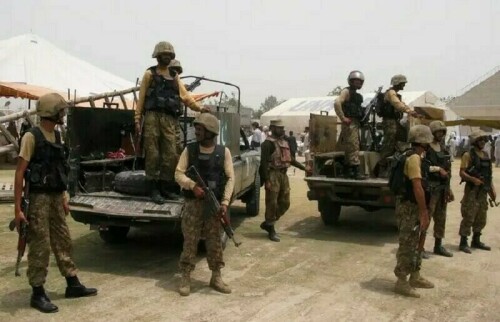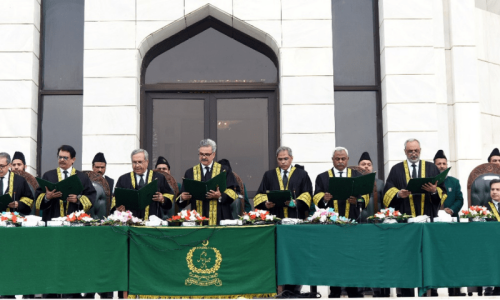THE federal cabinet has approved the National Security Policy after its green-lighting by the National Security Committee and the military spokesman has said that the armed forces will play their role in achieving the vision laid out in the policy.
National Security Adviser Moeed Yusuf told the media on Tuesday that it is a “citizen-centric” policy with economic security at the core. The policy took seven years to draft and included consultation with relevant people from all walks of life. It will be an evolving document so that it can retain relevance with changing times. Prime Minister Imran Khan has asked Dr Yusuf to provide monthly updates on the implementation of the policy. The NSA has said that a version of the policy will soon be shared with the public.
The report comes at a critical time when Pakistan is faced with multiple national security challenges. Keeping economic security at its core is also a sensible approach now that geoeconomics is the central tenet of our larger policy framework. It is hoped that the national security policy will focus attention on key priority areas and the approach required to realise the stated objectives. In addition, the policy should also bring greater coordination between various government agencies within the national security domain.
Read: Pakistan's focus shifting from geopolitics to geo-economics, Qureshi informs Hungary Dialogue
The fate of Nacta — an organisation that has been allowed to decay — is a stark warning that the best intentions can fall victim to turf wars and ego clashes. If this national security policy can facilitate smooth inter-agency and inter-organisation cooperation in this area, it would be able to achieve productive results.
However, there are some aspects of the policy that require prompt action. It was originally presented in the parliamentary committee which the opposition boycotted but this does not mean that the policy does not require proper debate. Now that the cabinet has approved it, the document should be shared with all parliamentarians and tabled in both Houses so that it can be debated and discussed threadbare. For it to be truly effective, the policy needs to have more input from legislators.
Another important question that the policy should pursue is trade with India. Since it is economic-centric, the policy requires an indepth review of whether Pakistan will benefit more by trading with India instead of staying away to register its rejection of New Delhi’s illegal occupation of Kashmir and especially the action of Aug 5, 2019.
There is a strong body of opinion among experts that states that trade should not be held hostage to politics, especially if it is in the economic interest of rivals to keep the doors of trade open without compromising on their political positions. It is high time Pakistan debated this issue with utmost seriousness instead of allowing emotions to drive policy. The national security policy should bring much-needed clarity in this respect.
Published in Dawn, December 29th, 2021












































